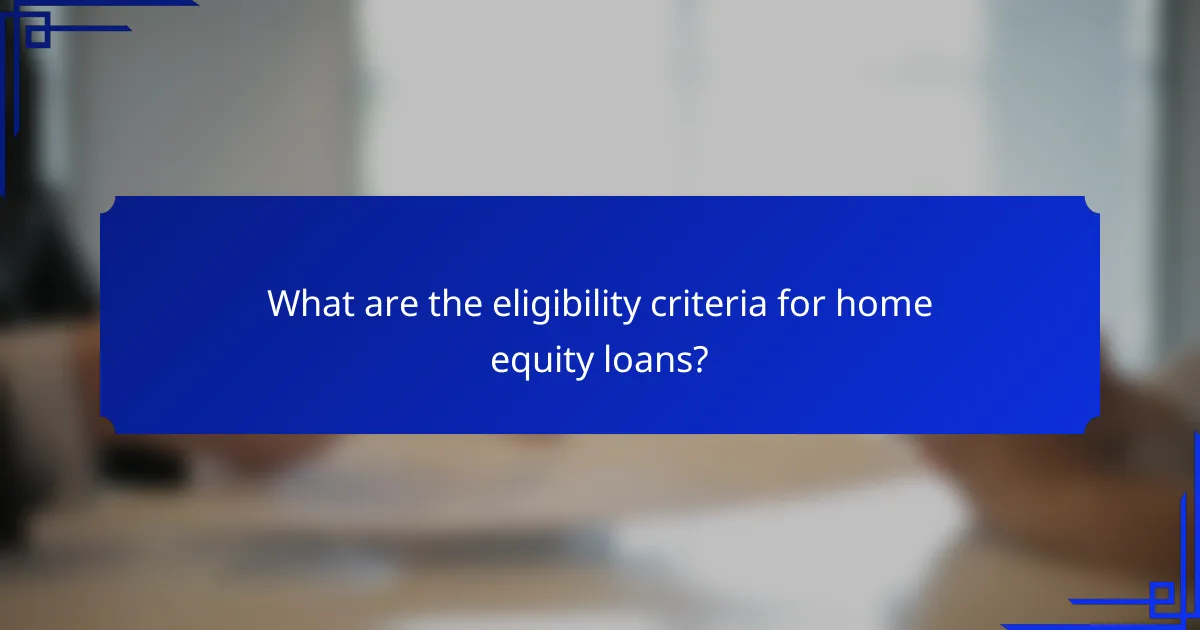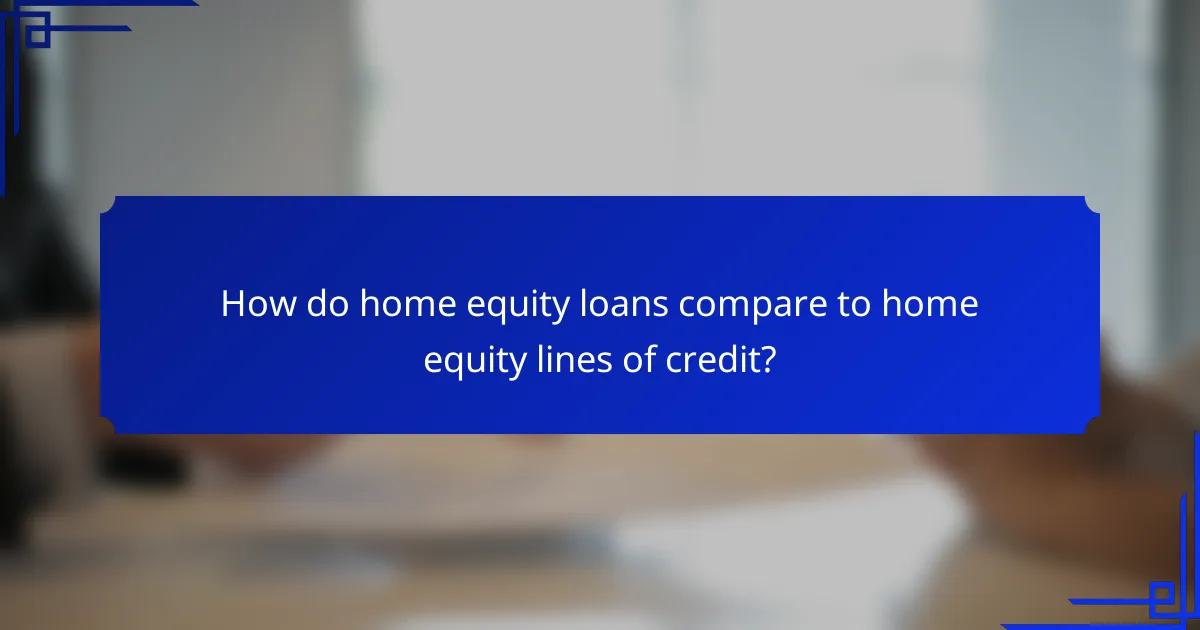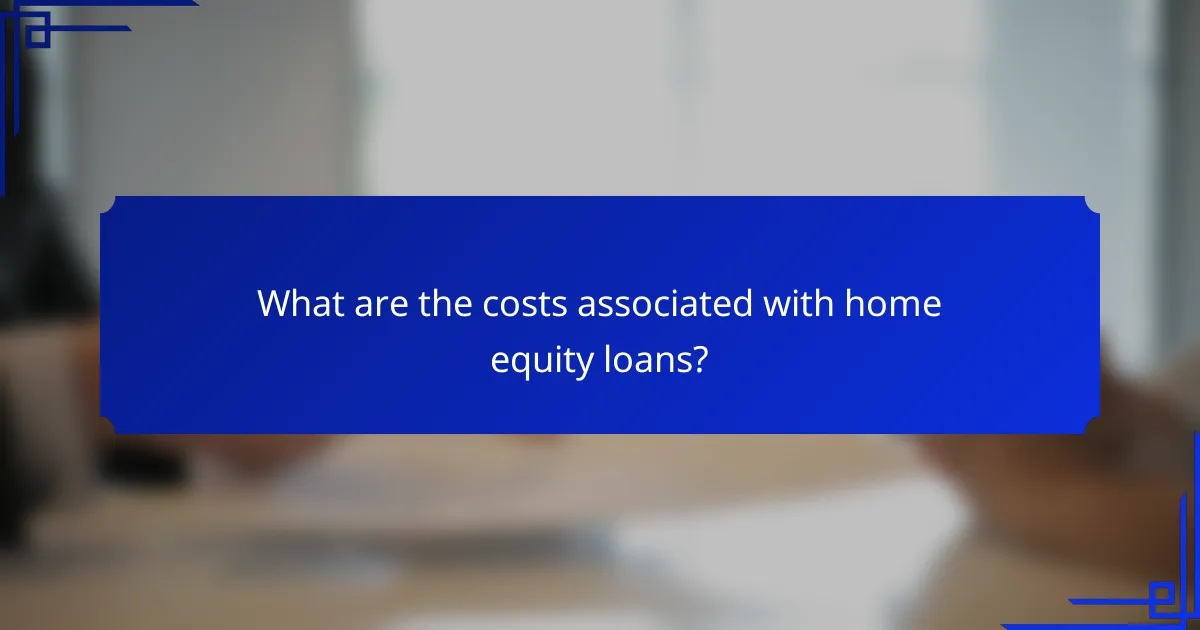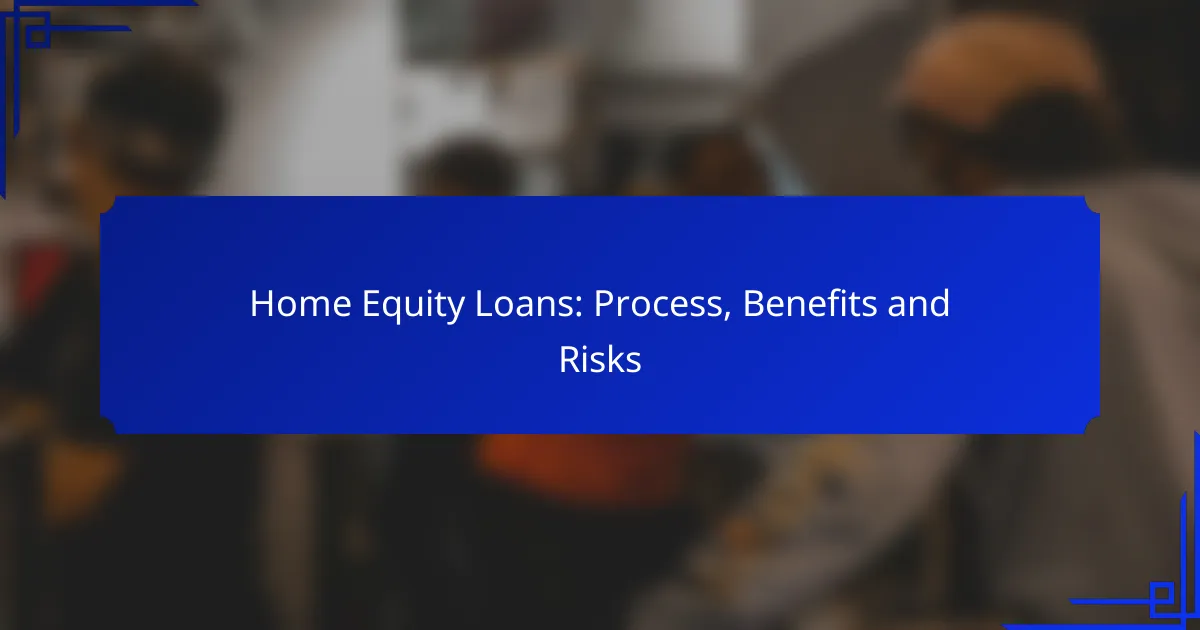Home equity loans enable homeowners to access cash by borrowing against the equity built in their property, providing a lump sum for various financial needs. While these loans can offer lower borrowing costs and potential tax benefits, they also come with risks, including the possibility of foreclosure and effects on credit scores. Understanding both the advantages and risks is essential for making informed financial decisions.

What are home equity loans?
Home equity loans allow homeowners to borrow against the equity in their property, providing a lump sum of cash for various needs. These loans are secured by the home itself, meaning the property serves as collateral for the borrowed amount.
Definition of home equity loans
A home equity loan is a type of second mortgage that enables homeowners to access the equity they have built up in their property. Typically, this equity is calculated as the difference between the home’s current market value and the outstanding mortgage balance. Home equity loans generally have fixed interest rates and are repaid over a set term.
These loans can be used for various purposes, such as home improvements, debt consolidation, or major expenses like education costs. However, since they are secured by the home, failure to repay can lead to foreclosure.
How home equity loans work
To obtain a home equity loan, homeowners typically undergo a similar process to that of a primary mortgage. This includes an application, credit check, and home appraisal to determine the amount of equity available. Lenders usually allow borrowing up to a certain percentage of the home’s equity, often around 80% to 90%.
Once approved, the borrower receives a lump sum payment, which they repay in fixed monthly installments over the loan term. Interest rates can vary based on creditworthiness and market conditions, but they are generally lower than unsecured loans due to the collateral involved.
Homeowners should carefully consider their financial situation before taking out a home equity loan. It’s crucial to assess the ability to make monthly payments and the potential impact on long-term financial health. Avoid borrowing more than necessary and ensure that the purpose of the loan aligns with overall financial goals.

What are the benefits of home equity loans?
Home equity loans offer several advantages, including lower borrowing costs and potential tax benefits. These loans allow homeowners to tap into their property’s equity, making them an attractive option for financing major expenses.
Lower interest rates compared to personal loans
Home equity loans typically have lower interest rates than personal loans because they are secured by the borrower’s home. This security reduces the lender’s risk, allowing them to offer more favorable terms. Interest rates can vary, but they often fall in the range of 3% to 7% depending on market conditions and borrower qualifications.
For example, if a homeowner takes out a $30,000 home equity loan at a 5% interest rate, the monthly payments will generally be lower than those for an unsecured personal loan of the same amount, which might have rates exceeding 10%. This difference can lead to significant savings over the life of the loan.
Tax-deductible interest payments
Interest paid on home equity loans may be tax-deductible, which can further enhance their financial appeal. Under current U.S. tax law, homeowners can deduct interest on loans used for home improvements or other qualified expenses, subject to certain limits. This deduction can effectively reduce the overall cost of borrowing.
Homeowners should consult a tax professional to understand the specific conditions and limits that apply to their situation. For instance, if a homeowner borrows $50,000 for renovations and pays $2,500 in interest, they may be able to deduct that amount from their taxable income, resulting in potential tax savings.

What are the risks of home equity loans?
Home equity loans carry several risks that borrowers should carefully consider before proceeding. The most significant risks include the potential for foreclosure and the impact on your credit score, both of which can have long-lasting financial consequences.
Risk of foreclosure
The risk of foreclosure is one of the most serious concerns when taking out a home equity loan. If you fail to make your loan payments, the lender can initiate foreclosure proceedings, which may result in the loss of your home. This risk is particularly pronounced if you borrow a large amount against your equity and face financial difficulties.
To mitigate this risk, it is crucial to assess your financial situation realistically before borrowing. Ensure you have a stable income and a budget that allows for timely loan repayments. Consider borrowing only what you can afford to pay back, ideally keeping your loan amount within a reasonable range of your home’s equity.
Impact on credit score
Home equity loans can also affect your credit score, which is vital for future borrowing. When you take out a loan, your credit utilization ratio increases, potentially lowering your score if you borrow a significant amount relative to your overall credit limits. Additionally, missed payments can severely damage your credit history.
To protect your credit score, make all payments on time and keep your debt levels manageable. Regularly monitor your credit report to catch any discrepancies or issues early. Aim to maintain a credit utilization ratio below 30% to help sustain a healthy credit score.

How to apply for a home equity loan?
Applying for a home equity loan involves a straightforward process where you leverage your home’s value to secure funding. Typically, you will need to assess your financial situation, choose a lender, and submit an application with necessary documentation.
Steps to apply for a home equity loan
First, evaluate your home’s equity by determining its current market value and subtracting any outstanding mortgage balance. This will give you an idea of how much you can borrow. Next, research various lenders to compare interest rates, terms, and fees.
Once you select a lender, complete their application form, which can often be done online. After submission, the lender will review your credit history, income, and debt-to-income ratio to assess your eligibility.
Finally, if approved, you will receive a loan offer detailing the terms. Review this carefully before signing, and be prepared for a closing process similar to that of your original mortgage.
Required documentation for application
To apply for a home equity loan, you will need to gather several key documents. Common requirements include proof of income, such as recent pay stubs or tax returns, and information about your existing mortgage, including the loan balance and payment history.
Additionally, lenders typically require a credit report, which they will obtain themselves, but you may want to check your credit score beforehand. Other documents may include a list of your assets and liabilities, as well as a copy of your homeowner’s insurance policy.
Having these documents ready can streamline the application process and help you avoid delays. Ensure all information is accurate and up-to-date to facilitate a smoother approval experience.

What are the eligibility criteria for home equity loans?
To qualify for a home equity loan, borrowers typically need to meet certain criteria, including credit score, equity in their home, and income stability. Lenders assess these factors to determine the risk associated with lending against the borrower’s home value.
Minimum credit score requirements
Most lenders require a minimum credit score of around 620 to 640 for home equity loans. A higher score can improve your chances of approval and may lead to better interest rates. It’s advisable to check your credit report and address any issues before applying.
Some lenders may offer loans to borrowers with lower credit scores, but this often comes with higher interest rates or additional fees. Always compare offers from multiple lenders to find the best terms available.
Equity percentage needed
Home equity loans typically require homeowners to have at least 15% to 20% equity in their property. This means that if your home is valued at $300,000, you should ideally have at least $45,000 to $60,000 in equity to qualify. Lenders use this equity as collateral for the loan.
Keep in mind that the total amount of debt on your home, including the new loan, should not exceed 80% to 90% of your home’s value. This is known as the loan-to-value (LTV) ratio, and staying within this range helps ensure favorable loan terms.

How do home equity loans compare to home equity lines of credit?
Home equity loans and home equity lines of credit (HELOCs) are both ways to borrow against your home’s equity, but they differ significantly in structure and usage. A home equity loan provides a lump sum with fixed payments, while a HELOC offers a revolving credit line with variable payments based on usage.
Differences in structure
Home equity loans typically have a fixed interest rate and a set repayment term, often ranging from 5 to 30 years. Borrowers receive a one-time payment, which they repay in regular installments. In contrast, HELOCs function more like credit cards, allowing homeowners to draw funds as needed during a draw period, usually lasting 5 to 10 years, followed by a repayment period.
While home equity loans provide stability with fixed payments, HELOCs offer flexibility, as borrowers can withdraw and repay funds multiple times. However, this flexibility comes with variable interest rates, which can lead to fluctuating monthly payments.
Use cases for each option
Home equity loans are ideal for large, one-time expenses, such as home renovations or debt consolidation, where a fixed amount is needed upfront. They are also suitable for borrowers who prefer predictable monthly payments and want to avoid the risk of rising interest rates.
On the other hand, HELOCs are better for ongoing expenses or projects, such as funding education or managing cash flow. They allow homeowners to borrow only what they need when they need it, making them a good choice for those who may not require a large sum all at once.

What are the costs associated with home equity loans?
The costs associated with home equity loans can vary widely, but they typically include closing costs, ongoing fees, and interest rates. Understanding these expenses is crucial for homeowners considering tapping into their equity.
Closing costs and fees
Closing costs for home equity loans generally range from 2% to 5% of the loan amount. These can include appraisal fees, title insurance, and attorney fees, which are necessary for processing the loan. It’s essential to ask lenders for a detailed breakdown of these costs before committing.
Some lenders may offer no-closing-cost options, but these often come with higher interest rates or reduced loan amounts. Weighing the pros and cons of these options can help you make a more informed decision.
Ongoing costs and interest rates
Ongoing costs for home equity loans primarily consist of interest payments, which can vary based on the lender and your creditworthiness. Interest rates typically range from around 4% to 10%, depending on market conditions and individual circumstances. Fixed-rate loans offer predictable payments, while variable-rate loans can fluctuate over time.
Additionally, homeowners should consider potential fees for late payments or annual fees, which can add to the overall cost. Keeping track of these ongoing expenses is vital to avoid financial strain and ensure that the loan remains manageable.

What are the alternatives to home equity loans?
Alternatives to home equity loans include personal loans, cash-out refinancing, and lines of credit. Each option has its own benefits and risks, making it essential to evaluate which best suits your financial situation.
Personal loans
Personal loans are unsecured loans that can provide quick access to funds without requiring home equity. They typically have higher interest rates compared to home equity loans, but they do not put your home at risk. Borrowers can usually obtain personal loans ranging from a few thousand to tens of thousands of dollars.
When considering a personal loan, check your credit score and shop around for the best rates. Lenders often offer different terms, so it’s wise to compare options before committing.
Cash-out refinancing
Cash-out refinancing involves replacing your existing mortgage with a new, larger mortgage and taking the difference in cash. This option can be beneficial if you can secure a lower interest rate on the new mortgage, potentially saving you money over time.
However, cash-out refinancing increases your mortgage balance and may extend your loan term. Ensure you understand the long-term implications and costs associated with this option before proceeding.
Home equity lines of credit (HELOCs)
A home equity line of credit (HELOC) allows you to borrow against your home’s equity, similar to a credit card. You can withdraw funds as needed during a draw period, which typically lasts several years, and only pay interest on the amount borrowed.
While HELOCs offer flexibility, they often come with variable interest rates, which can increase over time. It’s crucial to have a repayment plan in place to avoid potential financial strain when the draw period ends.
